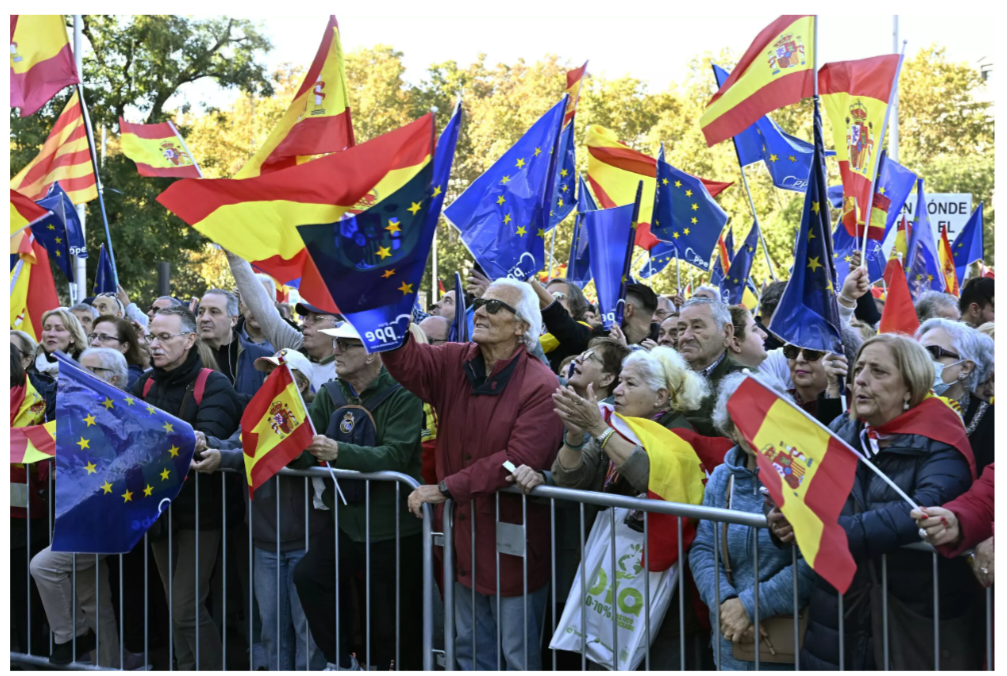Around 170,000 people, according to police, gathered in Plaza de Cibeles in the heart of the Spanish capital in response to a call by right-wing leaders opposed to the amnesty plan.
Tens of thousands of Spaniards took to the streets of Madrid on Saturday to denounce a proposed amnesty law for Catalan separatists and activists, which was key for the left-wing government to retain power.
Catalan is a Romance language from the Neo-Latin group, appearing between the eighth and tenth centuries in a part of Catalonia, in Northern Catalonia and in Andorra, in the territories of the Carolingian Empire that formed the counties of the Spanish March.
A Romantic language spoken in eastern and northeastern Spain—chiefly in Catalonia and Valencia—and in the Balearic Islands.
Cries of “Sanchez, Catalonia is Spain” were shouted by protesters of all ages who carried Spanish and other European flags distributed by the European People’s Party.
“What Pedro Sanchez wants is to cut Spain into pieces, to have the Basque country on one side and Catalonia on the other, and to say nothing happened,” said Maria Angeles Galan, a 65-year-old retiree from Madrid at the rally.
Socialist Prime Minister Pedro Sanchez, in power since 2018, came second in July parliamentary elections behind right-wing leader Alberto Nunez Feijoo, but managed to be reinstated after winning support from regionalist groups including Catalan pro-independence parties.
In exchange for their votes, which were essential for reaching a governing majority, Sanchez accepted several concessions including the adoption of the amnesty bill for separatist leaders and activists who were prosecuted for their involvement in Catalonia’s 2017 secession attempt.

The demonstrators protested an amnesty for those involved in Catalonia’s failed 2017 independence bid.
Feijoo had attempted in September to be chosen as prime minister with the support of Abascal, but failed to win a majority in parliament.
“I think that the fight starts now,” said Mariana, a 51-year-old entrepreneur at the protest who did not want to give her surname, adding that “it’s a message to Europe”.
Earlier this month, Brussels called on Madrid for an explanation on the amnesty bill after saying it had “been contacted about the issue by a large number of citizens”.
Luis Garrido, 65, who called himself a “socialist but not a Sanchist”, said the prime minister should not have accepted “this price”.
“I don’t want Spain to sink” and be “divided in this way”, he said.
The crowd that gathered around midday dispersed peacefully after speeches were made.
Demonstrations have been held every day for the past two weeks in front of the Socialist Party headquarters in Madrid, some of which have turned violent and resulted in dozens of arrests.
Sánchez was sworn in on Friday after winning an investiture vote the previous day that came almost four months after July’s inconclusive snap general election. Although the conservative People’s party (PP) narrowly beat Sánchez’s Spanish Socialist Workers party (PSOE) in the election, it was unable to secure the parliamentary support to form a government even with the backing of the far-right Vox party and other smaller groupings.
However, the PSOE and its partners in the leftwing Sumar alliance managed to cobble together the necessary votes by enlisting the support of the two main Catalan pro-independence parties in return for offering an amnesty for those involved in the unsuccessful, unilateral push to secede from Spain six years ago.
Sánchez’s decision to agree to the proposed amnesty – which he had opposed in the run-up to the election – has infuriated his political opponents, who have accused him of hypocrisy, cynical manoeuvring and putting his own political survival before the country’s interests. The move has also angered many Spaniards on the left and right.
The demonstration on Saturday, which was held by Madrid’s Cibeles fountain, was called by more than 100 groups and associations who had urged people “on the left, the right and in the centre” to turn out. The central government’s delegation to the region put attendance at 170,000, making it more than twice as big as the demonstration held in the capital last Sunday.
Police had to blockade a main road in the capital after the protest to stop hundreds of people attempting to march on the prime minister’s official residence, the Moncloa palace.
Some protesters carried placards reading “separation of powers”, “traitors” and “not in my name”, and there were chants of “Sánchez resign” and “Viva España”.
The demonstration, which followed other large rallies across Spain in recent weeks, was attended by the leaders of the PP and Vox.
Alberto Núñez Feijóo, the PP’s leader, once again accused Sánchez of committing a fraud against the Spanish people in order to stay in power.
“Sadly, we find ourselves at a very difficult moment and democracy’s warning lights are flashing,” he said on Saturday. “Being in power is one thing but being right is another. [The government] may have the MPs it needs, but it knows it doesn’t have the votes to do what it is doing.”
Vox’s leader, Santiago Abascal, said his party would not “give up this fight” and would continue the struggle through “sustained social mobilisation” and by “alerting our international allies to what is happening in Spain”.
The PSOE’s congressional spokesperson, Patxi López, said that while protesting was a right in any democratic system, Saturday’s demonstration was motivated by rightwing rancour at Sánchez’s return to office, rather than the proposed amnesty.

